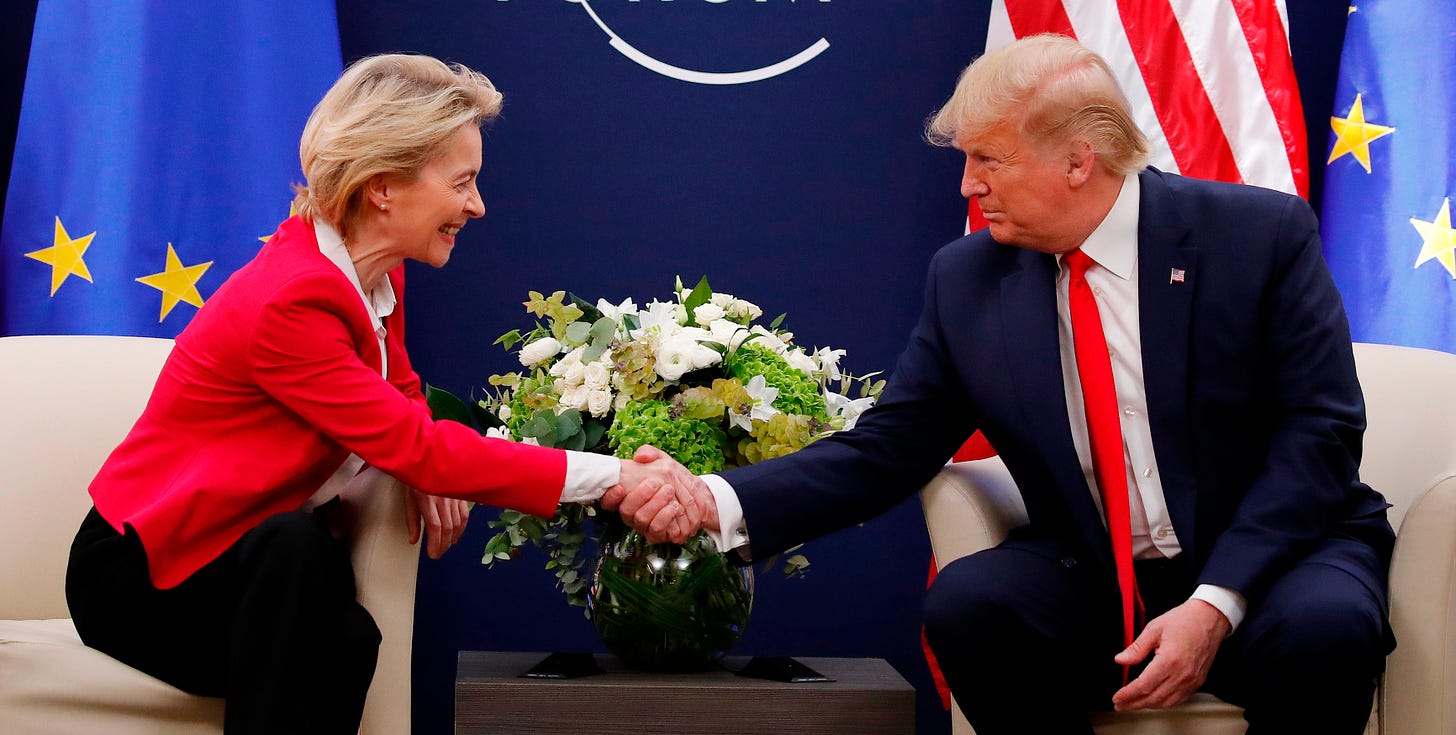Von der Leyen is unlikely to defend Europeans from Trump
The EU's deferential German president, restricted by the blinders of her Atlanticist generation, has so far shown an inclination toward surrender in the face of the new American president's threats.
As Donald Trump prepares to enter the White House again today, he’s facing a world that looks dramatically different from the one he encountered on January 20th 2017. At that time the world was reacting to the shock victory of Donald Trump, who himself seemed surprised by the win, by closing ranks. The Republican establishment moved quickly to surround the new president with ‘adults in the room’ to restrain his worst impulses. Angela Merkel emerged as the purported new ‘leader of the free world’ in Europe. European Commission President Jean-Claude Juncker was vowing to fight fire with fire with Trump’s floated punitive tariffs against the EU. The global democratic order was ready to fight back.
That is not happening this time around. As the New York Times wrote this weekend, “Defiance is out, deference is in”: “As he takes office again, Mr. Trump has discovered that he does not even have to take action to force his adversaries to adapt, back down or bend in his direction in a strategy of self preservation.” Domestically, America’s business, media and judicial institutions have quickly fallen into line behind Trump. The country is heading toward authoritarianism in a way which seems straight out of a history textbook. And internationally, there is no sign of the kind of resistance that we saw in 2017. A rudderless Europe with power vacuums in Germany and France has reacted with a collective shrug. Europe is surrendering, and that surrender is being led by the woman at the top: Commission President Ursula von der Leyen.
The incoming president of the United States earlier this month threatened to invade and annex the territory of an EU member state, and it took President von der Leyen two days to respond. When she did, all she could muster was a vague reference to the Greenland threat on Elon Musk’s X: "We look forward to a positive engagement with the incoming US Administration, based on our common values and shared interests," she wrote. The response was delusional or cowardly, or perhaps a bit of both.
She added, for good measure, "The EU will always protect our citizens and the integrity of our democracies and freedoms.” But who could possibly have confidence that the EU will protect its citizens under von der Leyen’s leadership? Throughout her first term, while busily consolidating her power within the EU institutions, she showed no appetite to take on EU national governments or the United States, which administers the union’s military defence. This deferential attitude is exactly why she was chosen by EU national leaders. But in making this choice the European Council of national leaders has shown characteristic short-sighted thinking. As I wrote in April of last year, these times call for an EU president who has demonstrated a willingness and an ability to stand up to bullies by being a bully themselves. To guarantee its own survival, the EU needed a president willing to stand up to a United States which is rapidly transitioning from an ally to an adversary. But because of the perverse system the EU uses to choose its president, that was never going to happen.
The EU's next president should be a bully
On Monday, the eight Spitzenkandidaten (lead candidates) for the EU election on June 9th will face off at a debate in Maastricht, the city where the European Union was created in 1992. It is the continuation of debates which started when the Spitzenkandidat system was created for the
The EU’s president is chosen by national prime ministers and presidents, and the leaders instinctively gravitate toward someone who will not challenge their own power. The problem is that by selecting acquiescent people who won’t challenge their authority (two-term Jose Manuel Barroso from 2004 to 2009 being a prime example), the leaders are also guaranteeing that they will have presidents who don’t stand up to foreign leaders either. Yes, von der Leyen has stood up to Putin - but only because it reflected the almost-universal consensus of national leaders in the European Council. She has always been the type of politician who goes with the flow and rides the political winds, both in Berlin and Brussels. All the elements of her biography and character make her ill-suited to be the person who saves Europe from Trump’s America. She is a German of a certain generation, wedded unwaveringly to Atlanticism and holding a naive reverence for the United States. She is one of the least likely people to protect Europeans from America.
Everything she has said and done since the US election leads to this tragic conclusion. As La Matinale Europeene observed last week, she seems all too eager to sell European sovereignty in exchange for Trump backing off on his trade war against Europe. Her timid reaction in the face of threats by American tech giants, such as Meta (Facebook/Instagram) owner Mark Zuckerberg asking Trump to dismantle the EU’s laws covering social media platforms, has indicated where things are going.
“In the corridors of Brussels, many suspect Ursula von der Leyen of wanting to cede the EU's digital sovereignty to Trump to avoid a trade war. The Commission President's silence on the destabilization campaign launched by Elon Musk, the owner of X, against some European democracies, and his support for the far-right AfD party in Germany are considered ‘suspicious’. But Musk's treatment is only part of a political change of direction recorded after the end of the Thierry Breton-Margrethe Vestager duo era. The Commission has in fact suspended investigations into major US platforms under the Digital Services Act and the Digital Markets Act. Sources cited by the Financial Times spoke of a ‘review’ of the investigations into Meta and X under the DSA, and into Meta, Amazon, Google and Apple under the DMA…Several sources confirmed that the ‘political level is not following’ [the investigations] due to fear of Trump’s reaction. ‘We are cautious not to irritate the Americans,’ one official told us.” - La Matinale Europenne.
One can imagine how a president Thierry Breton would have reacted to such threats. In fact we don’t have to imagine, because as the European far right join with Musk and Zuckerberg in their calls to dismantle the new EU digital laws trying to protect citizens from disinformation, Breton is loudly condemning and correcting them. Von der Leyen is not. In fact, she now she seems just as ready to throw her signature digital achievements out the window as she has been to throw her Green Deal climate achievements out the window. She is always following the prevailing political winds.
According to reports, the preparations that are being made within the Commission are for retaliatory tariffs in response to Trump triggering a trade war. The Commission is reportedly preparing a “deal” to offer Trump to beg him not to impose tariffs, which will include massive purchasing of American liquified natural gas (LNG), massive purchasing of military equipment from the US military-industrial complex (rejecting the French push for Europe to be self-sufficient in its arms production), and possibly setting up European peacekeeping forces to police the ‘surrender’ deal Trump is likely to force between Russia and Ukraine. There seems to be very little thinking about the bigger picture and the implications of the United States becoming a threat to Europe. It doesn’t seem to have sunk in that this is going to be very different from Trump’s first term - not only because the guard rails in Washington are gone but because the defences in Europe are gone as well.
According to an ECFR survey published last week, only one in five people in the EU now consider the United States an ally. Only 22% in the EU, and 15% in the UK, think Trump’s election was a good thing. And yet that public opinion by Europeans is completely at odds with the public pronouncements of their leaders, who keep effusively welcoming Trump’s presidency and talking about what a great ally the United States is. It’s not hard to see why - these are occupied countries. The reason European leaders cannot say what they or their citizens really think about Trump or the current situation in the United States is because they depend on the United States not only for their military protection but also for the basic underpinning of the Western economy. Two generations of Atlanticist leadership on this continent has created a relationship too big to fail. There is, in short, no plan B for if the United States is no longer an ally but rather an adversary. It is a scenario the European establishment has never allowed itself to even think about, other than in France.
But it is a scenario that is rapidly becoming reality, and Europe has absolutely no plan to deal with it. President von der Leyen is, in the end, a symptom rather than a cause of this European helplessness. She is who she is and where she is because this continent has collectively buried its head in the sand and refused to see what was developing across the Atlantic. Both von der Leyen and Trump are symptoms of their respective unions’ deep flaws.
Starting from today’s inauguration, the world is about to become extremely unpredictable and dangerous. It would have been nice if Europeans had built themselves the capacity to be shielded from these developments, by developing a strong and sovereign federal European Union. But Europeans have only themselves to blame for the helpless and impotent situation they now find themselves in. Their current leaders are not going to ride to the rescue. No one knows what is coming, but one thing is certain: Europeans are not in charge of their own destiny.
This week will be a make-or-break moment for von der Leyen to show how she is going to handle the Trump threat. In the next days following today’s inauguration she will speak at the World Economic Forum in Davos and at the European Parliament plenary in Strasbourg. European will be looking for her to have strong words backed by a real plan for defending Europe from Trump. Unfortunately, they are likely to be disappointed. This is not the hero Europe needs. But perhaps she is the president Europe deserves.






